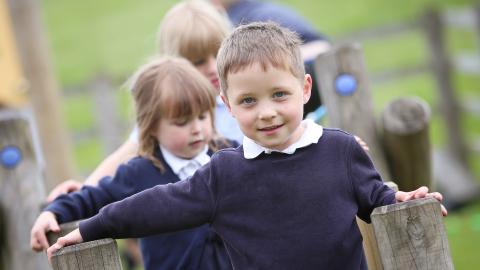At Threshfield Primary School, our ethos is to value every child as a unique individual, who enjoys learning and thinking for him or herself. Our aim within the Early Years Foundation Stage is to provide a happy, safe and stimulating environment, which allows all children to feel secure and valued and therefore ready and eager to learn. We provide a supportive and secure environment in which every child can flourish and learn at their own pace and in their own individual way. Our role is to stimulate and encourage their development and enjoyment of learning through a variety of different activities, both adult directed and child initiated in secure indoor and outdoor provision.
We believe the relationships which the children develop in the Early Years, with each other and with our staff, are central to their happiness and will lay the best possible foundation for them to become independent lifelong learners.
Our Curriculum
At Threshfield Primary School our Early Years Foundation Stage (EYFS) curriculum is carefully designed to follow the Statutory Framework for the Early Years Foundation Stage. This framework sets out the learning, development and assessment requirements for all EYFS children until the end of their reception year. Our engaging and enriching curriculum is further guided guided by a document called ‘Development Matters’ and Birth to 5 years.
The Early Years Foundation Stage is underpinned by four key principles:
A Unique Child
We recognise that all children are different. We identify and celebrate their strengths and support their areas for development.
Positive Relationships
Our pupils interact well with each other and with the adults in the school. We encourage parents to be involved with their child’s education.
Enabling Environments
Our indoor and outdoor areas encourage exploration, investigation, and independent learning. Our displays and resources are well maintained and reflect current learning.
Learning and Development
Pupils achieve well and make good progress from their starting points. Learning is playful, practical, and purposeful and builds upon prior attainment. Our children enjoy coming to school.
The children learn through seven areas:
Prime Areas |
Specific Areas |
|---|---|
| Communication and Language | Literacy |
| Physical Development | Mathematics |
|
Personal, Social and Emotional Development |
Understanding the world |
| Expressive Arts and Design |
These seven areas of learning build the foundation of future learning. To see the clear links between these areas of learning and the key stage 1 and 2 curriculum, please see the documents below.
Our Setting
The Early Years Foundation Stage classroom is organise into continuos provision. The purpose of continuous provision is "to continue the provision for learning in the absence of an adult". Therefore, the environment is absolutely vital to the development of the children; it is seen as an additional adult in the classroom. Each and every part of our learning environment has been carefully planned to meet and challenge the development needs of our children.
Learning opportunities are carefully planned around the interests of the children, with some direct teaching to meet the needs of our progressive curriculum and also planned to meet the developmental needs identified within our children. We support the children to develop their skills progressively in exciting, fun and creative ways to achieve the highest standards possible.
Tapestry
Tapestry is our assessment tracker, to record our children’s knowledge, skills and learning dispositions. It is a consistent and reliable way of demonstrating progress through the EYFS.
The statements within Tapestry correlate with Development Matters and the new Birth to 5 Matters that reflect an ‘age related expectation’. Tapestry recognises the importance and values the 'how' of learning and so the characteristics of effective learning and levels of well-being and involvement are recorded too.
Through daily observation and interaction we are able to build a rich and accurate understanding of each child across all aspects of learning and development.
Our assessments are meaningful and impact on our children’s learning and development as we use them to inform our children’s next steps which are personalised and challenging. Our observations then inform the assessments we make on Tapestry as children approach the end of each range milestone. We bring our knowledge of a child together during our weekly team meetings to ensure all members of staff have a thorough knowledge of each children. Our weekly team meetings, always begin with any safeguarding concerns to ensure the continued protection and safety of all the children.

